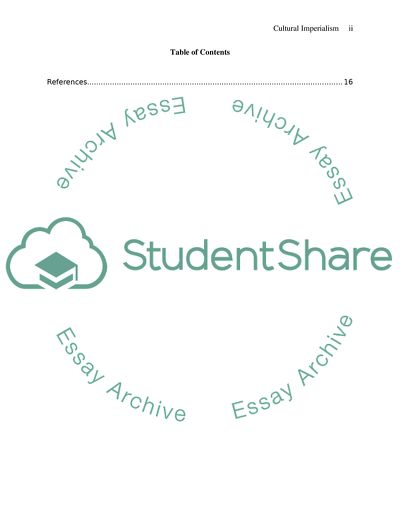Cite this document
(The Main Criticisms of the Cultural Imperialism Thesis Made by Media Coursework Example | Topics and Well Written Essays - 3750 words - 1, n.d.)
The Main Criticisms of the Cultural Imperialism Thesis Made by Media Coursework Example | Topics and Well Written Essays - 3750 words - 1. https://studentshare.org/media/1881784-outline-the-main-criticism-of-the-cultural-imperialism-thesis-made-by-media-globalisation-theorists-are-these-criticism-valid
The Main Criticisms of the Cultural Imperialism Thesis Made by Media Coursework Example | Topics and Well Written Essays - 3750 words - 1. https://studentshare.org/media/1881784-outline-the-main-criticism-of-the-cultural-imperialism-thesis-made-by-media-globalisation-theorists-are-these-criticism-valid
(The Main Criticisms of the Cultural Imperialism Thesis Made by Media Coursework Example | Topics and Well Written Essays - 3750 Words - 1)
The Main Criticisms of the Cultural Imperialism Thesis Made by Media Coursework Example | Topics and Well Written Essays - 3750 Words - 1. https://studentshare.org/media/1881784-outline-the-main-criticism-of-the-cultural-imperialism-thesis-made-by-media-globalisation-theorists-are-these-criticism-valid.
The Main Criticisms of the Cultural Imperialism Thesis Made by Media Coursework Example | Topics and Well Written Essays - 3750 Words - 1. https://studentshare.org/media/1881784-outline-the-main-criticism-of-the-cultural-imperialism-thesis-made-by-media-globalisation-theorists-are-these-criticism-valid.
“The Main Criticisms of the Cultural Imperialism Thesis Made by Media Coursework Example | Topics and Well Written Essays - 3750 Words - 1”. https://studentshare.org/media/1881784-outline-the-main-criticism-of-the-cultural-imperialism-thesis-made-by-media-globalisation-theorists-are-these-criticism-valid.


